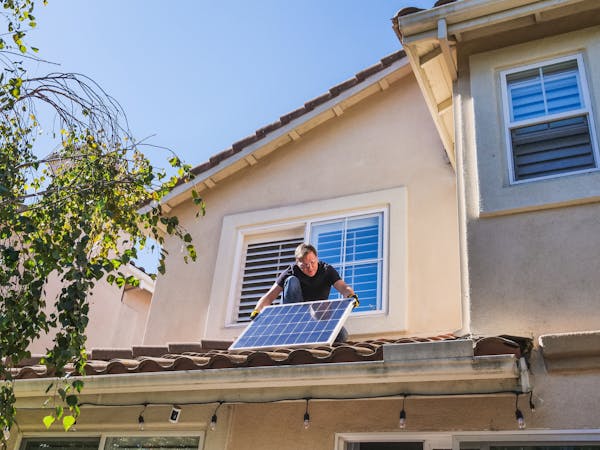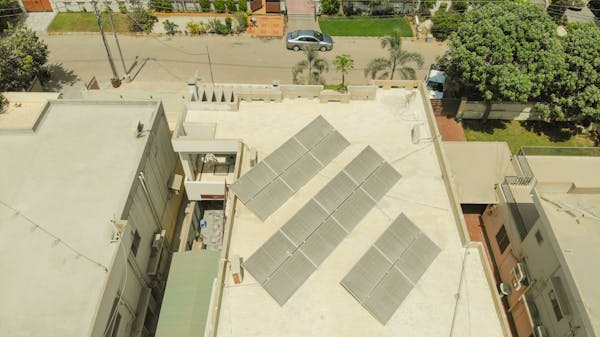What Are Residential Solar Panels?
Residential solar panels are systems designed to capture sunlight and convert it into electricity. These panels are typically installed on rooftops to take advantage of maximum sun exposure. By using solar energy, homeowners can lessen their dependence on conventional electricity sources, which often rely on fossil fuels.
With residential solar panels, you gain access to renewable energy, contributing to a greener planet while also securing a sustainable solution for your home’s electricity needs.

How Do Residential Solar Panels Work?
Understanding the basic workings of solar panels can help you see their value. Here's a simple breakdown:
Solar Cells Absorb Sunlight
Residential solar panels are made up of photovoltaic (PV) cells that capture sunlight. These cells convert solar energy into electricity.
Electric Current is Generated
Once sunlight hits the PV cells, it creates direct current (DC) electricity. This energy flows to an inverter.
Conversion to Usable Electricity
The inverter changes the DC electricity into alternating current (AC) electricity, which is compatible with your home’s electrical system.
Energy Usage and Storage
The electricity can be used immediately to power your home or stored in solar batteries for later use, such as at night or during cloudy weather.
Benefits of Residential Solar Panels
There are several compelling reasons for installing a residential solar panel system, including both financial and environmental benefits.
1. Reduced Energy Bills
Enjoy lower utility bills by generating your own power. Many homeowners achieve significant savings, with some even becoming energy independent.
2. Environmentally Friendly
By using solar energy, you reduce greenhouse gas emissions and lessen your reliance on fossil fuels, contributing to a cleaner, healthier environment.
3. Enhanced Property Value
Homes equipped with residential solar panels are often more attractive to buyers. Solar panels are seen as an upgrade, enhancing a property’s value and appeal.
4. Government Incentives
Many regions provide tax breaks, rebates, or grants to support homeowners who choose solar energy. Check for local incentives that could make the transition even more rewarding.
5. Energy Independence
Solar panels provide homeowners with the freedom to produce their own energy. Paired with a solar battery, your home can stay powered even during outages or peak demand periods.

Tips for Choosing the Right Residential Solar Panel System
Selecting the right solar solution is key to getting the most out of your investment. Here are some tips to consider:
- Assess Your Energy Usage
Start by reviewing your electricity bills to understand your energy consumption. This will help determine the size of the system you’ll need. - Evaluate Your Roof
Solar panels work best when installed on a roof with plenty of sunlight. Ensure your roof is in good condition and has sufficient space for the installation. - Research Providers
Choose a reliable solar company with excellent customer reviews and a track record in the industry. Check warranties and service offerings before making a decision. - Explore Financing Options
From loans to leases, various financing methods make it easier for homeowners to afford a solar energy system. Research which options work best for your financial situation. - Consider Solar Batteries
A solar battery stores excess energy for later use, ensuring a steady power supply even when it’s cloudy or during nighttime. It’s especially useful in areas prone to power outages.
Is Installing Solar Panels Right for You?
Many homeowners find that residential solar panels are an excellent investment. Besides the environmental benefits, the long-term savings on electricity make solar panels an appealing option for those looking to reduce their expenses.
If your home gets plenty of sunshine and you’re looking for ways to minimize your carbon footprint, solar panels can be a game-changer.
Conclusion
Residential solar panels are a practical and impactful way to generate clean energy for your home. They reduce your utility bills, boost your property value, and help protect the environment.
If you’re considering switching to solar, now is the perfect time! Start by contacting a trusted solar provider for an energy assessment tailored to your home’s needs. Take the first step toward a brighter, greener future today.
Make the switch to solar power and join the growing community of eco-conscious homeowners making a real difference!